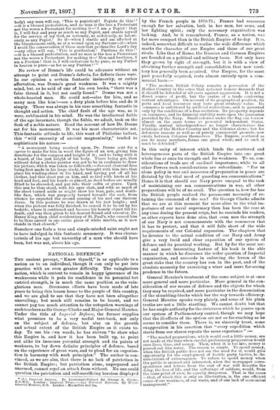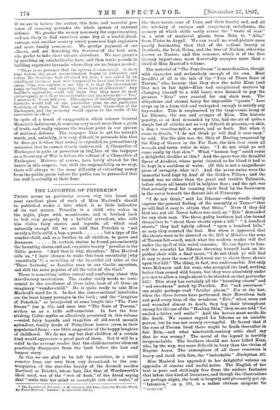NATIONAL DEFENCE.* THE ancient precept, "Know thyself," is as applicable
to a nation as to an individual, though it can only be put into practice with an even greater difficulty. The vainglorious nation, which is content to remain in happy ignorance of its weaknesses while it puts its confidence in its potential but untried strength, is in much the same position as the vain- glorious man. Strenuous efforts have been made of late years to bring this lesson home to the people of this country, and we are glad to see that they have not been altogether unavailing; but much still remains to be learnt, and we cannot pay too much attention to the outspoken warnings of such teachers as Sir George Clarke and Major-General Maurice. Under the title of Imperial Defence, the former supplies what promises to be a very useful text-book, not only on the subject of defence, but also on the growth and actual extent of the British Empire as it exists to- day. To use his ewn words, he has striven "to show what this Empire is, and how it has been built up, to point out alike its immense potential strength and its points of weakness, to lay down definite principles of defence, based on the experience of great wars, and to plead for an organisa- tion in harmony with such principles." The author is con- vinced, as we are also, that there is no lack of patriotism in the British Empire; but patriotism alone, unprepared and unarmed, cannot repel an attack from without. No one could question the patriotism and self-sacrificing heroism displayed • (1.) Imperial Defence. By Lieutenant-Colonel Sir George R. Clarke, E.C.M.G. London : Imperial Press.—(2.) National Defences. By Mgjor- General Maurice, 0.11. London : Macmillan and Co.
by the French people in 1870-71; France bad resources enough for her salvation, both in her men, her arms, and her fighting spirit ; only the necessary organisation was lacking. And, be it remembered, France, as a nation, was far more compact than is the British Empire of to-day. It is, indeed, somewhat difficult to realise the wide difference which marks the character of our Empire and those of our great rivals. Like that of Rome, the Russian and German Empires are founded on a political and military basis. Not only have they grown by right of strength, but it is with a view of obtaining further strength and consolidation that new terri- tory has generally been acquired. Our Empire, for the most part peacefully acquired, rests almost entirely upon a com- mercial basis:—
" The modern British Colony remains a possession of the Mother Country in the sense that national honour demands that it should be defended at all costs against aggression. It is not a direct source of profit, but the centre of a trade conferring mutual advantages. On account of its geographical position, its ports and local resources may have great strategic value. Its commerce is unfettered by artificial restrictions, and is governed only by the conditions of a free evolution. Its prosperity depends on commerce, and its financial stability rests upon the guarantee provided by the Navy. Small colonies under the flag can borrow almost on the same terms as powerful independent States. Finally, mutual interdependence no longer characterises the relations of the Mother Country and the Colonies alone ; but for defensive reasons as well as on purely commercial grounds, now exists between Colonies themselves. The Empire, scattered as are its many members, forms one great whole, and as such it must be defended."
In this unity of interest which binds the scattered and heterogeneous parts of the British Empire into one great whole lies at once its strength and its weakness. To us, con- siderations of trade are of cardinal importance, while to all other Powers such considerations are subordinate. "For us alone policy in war and measures of preparation in peace are dictated by the vital need of guarding sea communications." Hence it is that should our Navy prove unequal to the task of maintaining our sea communications in war, all other preparations will be of no avail. The question is, how far has the British people realised the paramount necessity of re- taining the command of the sea? Sir George Clarke admits that we are at this moment far more alive to the vital im- portance of our naval supremacy than has been the case at
any time during the present reign, but he reminds his readers, as other experts have done also, that even now the strength of our Navy is not commensurate with the commerce that it has to protect, and that it still falls short of the wide requirements of our Colonial expansion. The chapters that he devotes to the actual condition of our Navy and Army give a very lucid and clear exposition of our system of defence and its practical working. But by far the most use- ful and most interesting feature of his book is the able manner in which he discusses the wider question of Imperial organisation, and succeeds in enforcing the lesson of the great risks that the country has run in the past, and of the
absolute necessity for exercising a wiser and more far-seeing prudence in the future.
General Maurice's treatment of the same subject is at once more general and more particular. More general in the con- sideration of our means of defence and the objects for which they may be required, and more particular in the denunciation of the stumbling-blocks which bar the way towards efficiency.
General Maurice speaks very plainly, and some of his plain truths are not a little startling. We cannot doubt but that he has ample authority for the strictures which be passes upon our system of Parliamentary control, though we may hope
that the ill-effects of the system are not so far-reaching as he seems to consider them. There is, we sincerely trust, some exaggeration in his assertion that "every expedition which
starts from our shores repeats the same experience"
"The needed preparations, which would cost a little money, are not made at the time when careful, preliminary preparation would save lives, time, and money. Then, when it is too late, money is poured out like water. The reason is simple. To spend money, when the British public does not see the need for it, would give opportunity for the employment of hostile party tactics, to de- nunciations of extravagance. To refuse to spend money when the public is aroused and interested, when the newspaper corre- spondence and letters from the seat of war will describe the delay, the loss of life, and the sufferings of soldiers, would, from the same point of view, be equally dangerous. That is the cause —that, of which this is only an illustration, is the one efficient cause of our weakness, of our waste, and of our lack of economical management."
If we are to believe the author, this false and wasteful pre- tence of economy pervades the whole system of national defence. We grudge the money necessary for experimenting, lud are likely to find ourselves some day at a woeful disad- vantage with another country which possesses high explosives and more deadly armament. We grudge payment of our officers, and are denuding the Services of the best men, who prefer to take their talents elsewhere. We save pennies by patching up uninhabitable huts, and then waste pounds in building expensive barracks where they are no longer needed :
"There is no pretence that the system is economical. A short time before the great reconstruction began at Aldershot, and before Mr. Stanhope had obtained his vote, I was asked by an intelligent business man who happened to have just been in the camp, Can you explain to me why it is that the Government keeps on building and repairing those huts at Aldershot ? Any builder's apprentice could tell them that they must be most extravagant, as well as uncomfortable and inconvenient'—' Yes,' I answered, 'I can tell you. The expense of building permanent barracks would fall on one particular year, on one particular Secretary of State for War, one particular Chancellor of the Exchequer, and the economy would appear to the credit of his successors in office.'"
In spite of a touch of exaggeration which colours General Maurice's indictment, it contains very much more than a grain of truth, and really exposes the weakest point in our system of national defence. The taxpayer likes to get his money's worth, and, unluckily, it is very difficult to persuade him that he does get it when that money is expended on precautionary measures that he cannot clearly understand. A Chancellor of Exchequer is quite as powerless in the: face of the taxpayer as a Secretary of War is before the refusal of a Chancellor of Exchequer. Matters, of course, have lately altered for the better in this respect ; but, shift the responsibility as we may, there will always be the same difficulty of extracting money from the public purse before the public can be persuaded that the wolf is actually at their door.







































 Previous page
Previous page